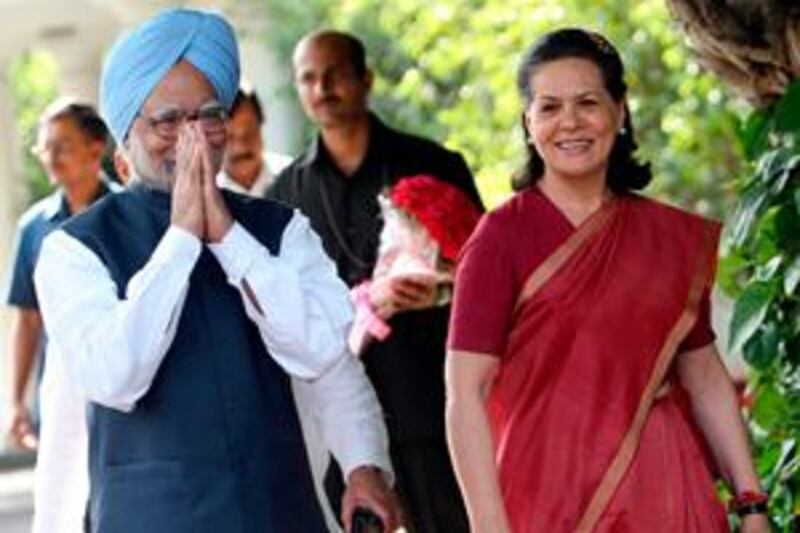MUMBAI // The day before results of India's month-long election were announced, political pundits were predicting a hung parliament. Speculation was rife that alliances of convenience would be forged between unlikely political partners through back room deals. But Indians woke yesterday to the news that they had voted in a stable government that is expected to last its full five-year term without falling back on the support of unpredictable coalition partners.
The Congress-led United Progressive Alliance (UPA) was re-elected with 256 out of 545 seats. The Congress Party alone won 202 seats. Manmohan Singh is expected to be sworn in for his second term as prime minister, the only one in India's history to have two consecutive full terms in office since India's first prime minister, Jawaharlal Nehru. The election results, analysts say, reflect India's desire for stability, especially with the country facing a slowing economy and a tenuous security situation. "Indian elections are an aggregation of elections in 28 states," said Rahul Verma, a researcher with Lokniti, a research programme of the New Delhi-based Centre for the Study of Developing Societies (CSDS). "It was expected that strong regional parties across these states would play kingmakers. But the mandate shows the shift of the electorate towards national parties who promise stability and good governance."
The result, Mr Verma said, reflects India's rejection of regional parties who exhibited parochial regional agendas, and the Communist Party of India-Marxist-led Left Front, a former UPA ally, that professed policies that threatened to hinder economic growth. The UPA, Mr Verma said, won a big chunk of rural votes with key economic policies like the landmark National Rural Employment Guarantee Programme, an ambitious anti-poverty project that aims to create employment opportunities in rural areas. Launched in 2005, the programme guarantees one member from every rural Indian family at least 100 days of employment. Also, Congress'initiative to waive farm loans in the Vidharba region of north Maharashtra, where farmer suicides had become endemic, was popular with rural voters.
"Congress is viewed as a political party that works for people at the bottom of India's economic pyramid," said Yogendra Yadav, a senior fellow at CSDS. Corporate India, too, has welcomed the return of Manmohan Singh as prime minister. Viewed widely as a sober intellectual with an unblemished political record, Oxford-educated Mr Singh is also a highly qualified economist, who analysts say can create a blueprint for India's resurgence in this harsh economic climate.
A corporate poll done by the business desk of New Delhi Television, a news channel, revealed that 75 per cent of people from corporate India said Mr Singh's return was a good sign for the economy and he was expected to implement reforms in the pension, insurance and retail sectors. According to the poll, 80 per cent believe his government will manage to attract large foreign investment to the country.
But a key expectation from Mr Singh is to bring about significant land reforms, something he could not deliver in his previous term. With the economic boom, India has whetted a large appetite for industrialisation. Multinational companies have made a beeline here, eager to start factories. In its previous term, the UPA approved the creation of 250 Special Economic Zones (SEZs) - tax-free industrial enclaves to promote trade and exports - across the country. But it faced a major hurdle - land procurement.
In a country where agriculture is the mainstay, the country has faced a major dilemma of how to divert farm land to industries. The Left Front, which has held power in West Bengal for three decades, suffered a sharp defeat in this election, mainly because of its effort to divert farm land in rural Bengal to Tata's Nano manufacturing plant, which saw a violent backlash from farmers. Analysts warn Congress could face the same situations in other states where SEZs are being developed. But the party has assured it will initiate land reforms in this term.
Congress defeated its rival, the Hindu nationalist Bharatiya Janta Party, which analysts say reflects a mandate against communalism. The Congress stands out as a secular political party that can maintain harmony in this diverse multi-ethnic country. The UPA was also given credit for a successful foreign policy. It forged the Indo-US nuclear deal after several difficult rounds of negotiations with the United States, despite not being a signatory of the Comprehensive Test Ban Treaty.
But analysts say Mr Singh is taking on a difficult foreign policy agenda. "India's neighbourhood is in a mess," said Amitabh Mattoo, a professor of international relations at the Jawaharlal Nehru University in New Delhi, "and the going will be tough amid the regional instability." achopra@thenational.ae





